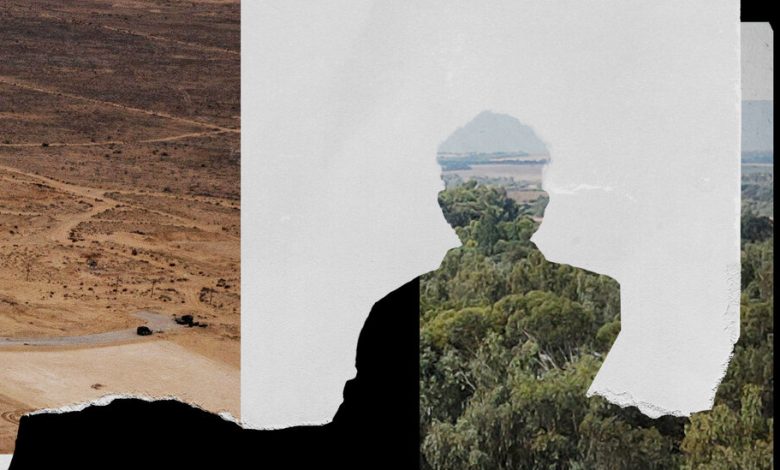A Flood of Evil Is Destroying My World

Ten years ago, we were preparing to celebrate the bar mitzvah of our son, Hersh. His Torah portion was the same as the one Jews around the world will read in the coming days — the story of Noah and how God destroyed much of the world with a terrible flood.
But Hersh’s attention was not on destruction. Instead he focused on how water could save the world. So he swam laps to raise money for an organization that digs wells in Africa to provide clean, lifesaving water.
This is the kind of person Hersh, our oldest child and only son, is: gentle and kind and always finding creative ways to improve things and connect with other human beings.
This is the person that Hamas terrorists have taken among their innocent captives, which include children, women and older people.
Hersh was camping with his best friend at an outdoor music festival near Israel’s border with Gaza when Hamas terrorists began firing machine guns into the crowd of mostly young adults. An estimated 260 people were killed in that attack. We later found out Hersh and his friends managed to escape by car but the vehicle came under rocket fire. They were forced to stop and take cover in a roadside bomb shelter. Terrorists then attacked the shelter, blowing off Hersh’s arm from the elbow down by machine gun fire or a grenade or both.
According to witnesses, Hersh, a 23-year-old American-born U.S. citizen, was then ordered into a pickup truck by armed Hamas terrorists and driven toward the Gaza border. The police told us the last known location of his mobile phone was on the Gaza border early Saturday afternoon.
I don’t know if he is dead or alive or if I will ever see him again.
The only thing I know is that this is not the fate that Hersh or any of the captives, among whom are several other Americans, deserves. I am heartbroken, but the messages of support pouring in from near and far make this moment heartwarming at the same time.
I wept this morning receiving messages from his friends in Bremen, Germany, which is home to SV Werder, the team that has a friendly relationship with Hersh’s beloved Hapoel Jerusalem soccer team. He befriended these German fans over the years when they visited Jerusalem to watch their team play soccer. Together they painted a peace mural with both Arab and Jewish residents near our home in Jerusalem, where we’ve lived since Hersh was 7. Just five weeks ago, Hersh spent time with these friends in Germany.
The outreach from these German friends resonates with me especially because Hersh is named after my grandfather Harold and my great-uncle Hershel, who was killed in the Holocaust. It was beautiful for me to be reminded, through these friendships, that for young Germans and Jews particularly, the world that Hersh has lived in has recognized and worked to overcome the terror experienced by my great-uncle.
I never could have imagined that my son would face anything like Hershel faced.
But this is the new world that Hersh and the rest of us must live in now. The Hamas attacks were the most vicious assaults on Jews since the Holocaust.
I want things to go back to how they were before Saturday morning. Before I saw Hersh’s text messages that alerted me he was in grave danger: “I love you” and “I’m sorry.” Before Hamas launched its attacks, which have claimed more than 1,200 innocent lives in Israel and resulted in about 150 innocent hostages being held in Gaza with no foreseeable way out. Before my son’s phone was a black box with no answer.
But here we are, stuck in the awful present. Time is slowly ticking into the future, with these hostages approaching a week in captivity. If he is still alive, how much longer can he survive? His wounds are grievous. I hope someone somewhere is being kind to him, caring for him, attending to him.
Hersh is my whole world, and this evil is the flood that is destroying it. I really don’t know if anything can save it. If anyone knows, please tell me. To save a life, our sages taught, is to save a world. Please help me save my son; it will save my world.
Every single person in Gaza, has a mother, or had a mother at some point.
And I would say this, then, as mother to other mothers: If you see Hersh, please help him. I think about it a lot. I really think I would help your son, if he was in front of me, injured, near me.
Rachel Goldberg is a mother of three living in Jerusalem, where she works as an educator and a student counselor. She is originally from Chicago.
Source photographs by Jack Guez and Menahem Kahana, via Getty Images.
The Times is committed to publishing a diversity of letters to the editor. We’d like to hear what you think about this or any of our articles. Here are some tips. And here’s our email: [email protected].
Follow The New York Times Opinion section on Facebook, Twitter (@NYTopinion) and Instagram.
